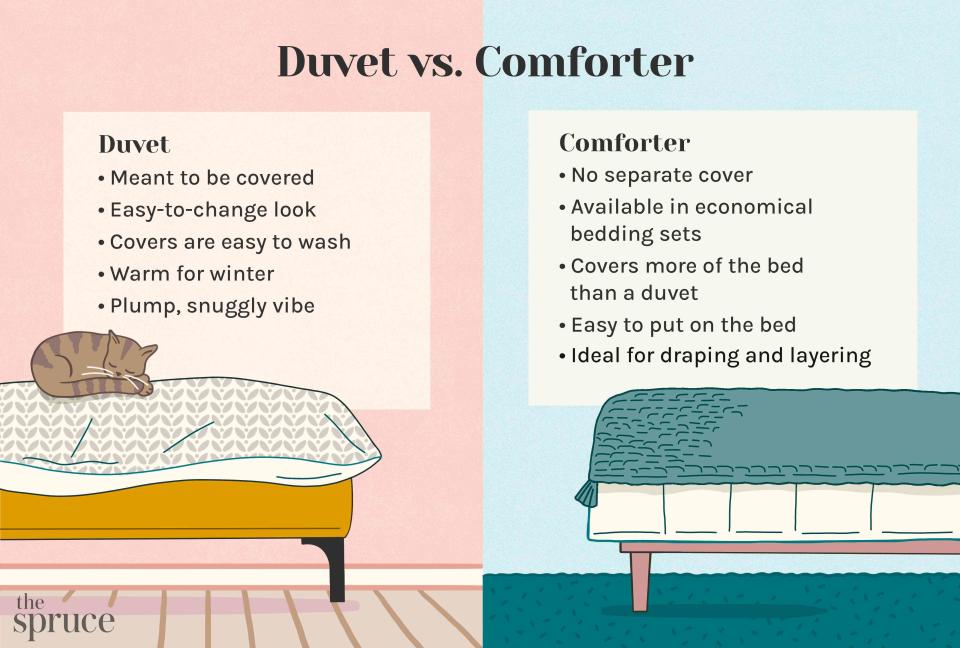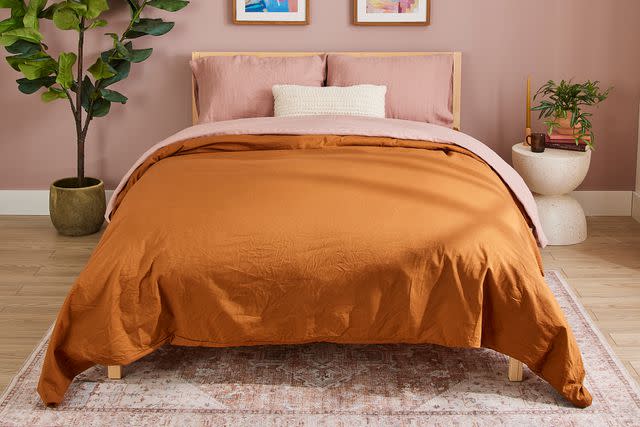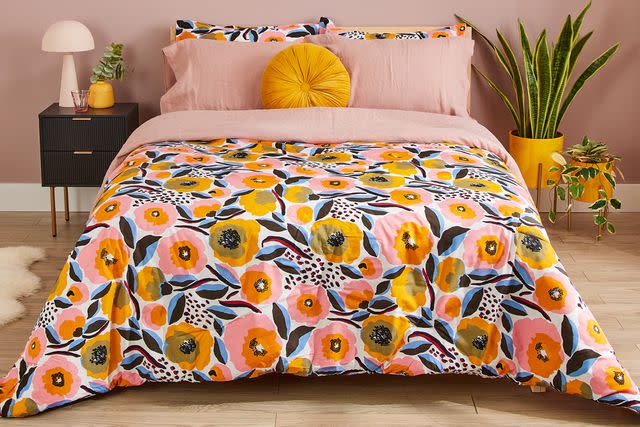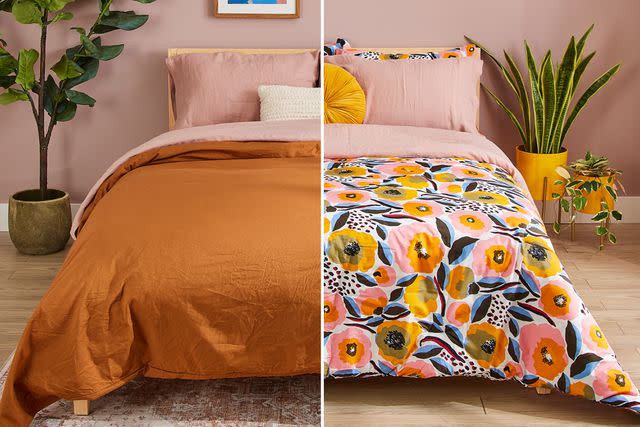Duvet vs. Comforter: What's the Difference and Which to Get
A duvet is meant to be covered, while a comforter is a stand-alone piece

The Spruce / Grace Canaan
Duvets and comforters are both bed toppers and they may look similar at first glance but they are not the same things. A duvet is a bed cover meant to be inserted in a duvet cover so it is kept clean but a comforter is an all-in-one bed topper that does not require a cover. Learn more here about the duvet vs. comforter debate to see which bed cover is best for your needs.
What Is a Duvet?

The Spruce / Jacob Fox
A duvet is a soft, puffy bed cover made from a cotton or polyester shell. It's typically filled with insulating down, feathers, or synthetic fabrics of varying thickness and then stitched closed. To keep the duvet clean and to jazz up the design, you put it inside a removable, easy-to-clean duvet cover that closes with zips, buttons, or ties.
Pros
Easy-to-change look
Covers are lightweight and easy to wash
Warm for winter
Plump, snuggly vibe
Cons
Higher cost
Challenging to insert the duvet into the cover
Duvet drifts or slides if corners are not secured inside the cover
Often needs professional cleaning
What is a Comforter?

The Spruce / Jacob Fox
Like a duvet, this quilted blanket often also has a synthetic fiber filling stitched to keep it from clumping. However, a comforter is a stand-alone bed topper that's placed over your bed sheets. It's typically not as thick as a duvet and it does not have a separate cover. Usually, a comforter overhangs the sides of the bed more than a duvet does.
Pros
Bedding sets available for all budgets
Covers more of a bed than a duvet
Easy to put on the bed
Ideal for draping and layering
Good in year-round weather
Cons
Bulky
Might need additional blankets
Often needs professional cleaning
Can't easily change out designs
Flattens out over time
Should You Get a Duvet or Comforter?

The Spruce / Jacob Fox
Duvet (L) vs. Comforter (R)When deciding whether to drape a duvet or comforter on your bed, you'll have to weigh their differences and your priorities. Consider the following to help you make a choice.
Comfort
Because duvets are more fiber-filled, it creates that perfect plump, snuggly vibe that makes your cozy bedroom seem all the more inviting. However, they can be subject to "duvet drift." And, even if you can remedy it with a vigorous shake, it can spoil your slumber when the duvet clumps up in one corner of the cover.
Comforters lie flat on your bed and work well when layering your bedding for textural design and comfort. For example, you might want to combine it with a fleecy weighted blanket.
Price
Even the best comforters are less pricey than high-quality duvets. But you might need additional blankets if the weather turns cold. Plus, if you damage or stain your comforter or want to change the design, you can't just replace the cover as you can with a duvet.
Duvets tend to be more pricey, especially if you opt for a down or feather filling. The more insulating a duvet is, the more costly it is.
Comforters are often part of economical bedding sets that include fitted sheets, flat-top sheets, and pillowcases. Duvet covers often also come as part of a bedding set, but you have to buy the actual duvet separately.
Design
Changing up your bedding design is an easy and budget-friendly way to makeover your bedroom. Swapping out a duvet cover is less expensive and more environmentally friendly than opting for an entirely new comforter.
Cleaning
Washing a thin duvet cover is much easier than a heavy comforter. But. while covers might be quick and easy to clean and dry, the duvets aren't. Depending on its thickness and the filler material, you might be able to wash your duvet at home, but you'll probably need to make a trip to the laundromat.
You might still need to get your comforter professionally cleaned. But if you have a drum capacity of 5.0 cubic feet or larger, you can often freshen up a king-size comforter in your home washer.
Convenience
Ditch the duvet if you hate wrestling with how to get the duvet cover on. Even if you find a time-saving technique, changing the duvet cover is more complex than simply spreading the comforter over your bed.
However, you might have to fit a top sheet alongside a comforter for hygiene reasons, so there's an extra bed-making hassle to consider with this option too.
Plus, if you want to switch out your comforter for design purposes at different times of the year, storing the alternative one takes up more space than a spare duvet cover.
Climate
Comforters are light covers that work well when summers are hot. But you'll often have to combine them with cozy blankets if things turn cold.
A mid-range duvet might work in all seasons, but if you opt for one with a lower thermal insulation quality for sticky summer nights, you'll likely have to swap this out for a snugger variety when the frosty weather arrives.
Sleeping Habits
If your partner is always stealing the sheets, a drapey comforter that covers more of the bed than a duvet might appeal. But, if you like to feel snug as a bug, stick with a fluffy duvet.
Duvet vs. Comforter Sizes
A duvet and duvet cover will sometimes be smaller in size than a comforter meant for the same size bed. A duvet and duvet cover, however, may be puffier than a comforter. Consider duvet and comforter sizes when choosing between the two for your bed. Sizes differ from brand to brand for both types of bed covers. You may want to go a size up—for example, you may want to buy a queen-sized duvet or comforter for your full-sized bed for extra overhang on the sides of the bed. Before shopping, always take the measurements of your bed so you can compare products.
Frequently Asked Questions
Which is better: a comforter or duvet?
Both duvets and comforters have their benefits, and one isn't necessarily better than the other. If you hate changing duvet covers, then a comforter might be more appealing. But for some, being able to change the duvet cover is attractive as it offers design flexibility and ease of cleaning.
Can you use a duvet as a comforter?
Using a duvet as a comforter and without a cover is not ideal. Duvets are typically white and uncovered duvets will become dirty very fast. It's not easy to wash a duvet but much easier to wash a duvet cover.
Do hotels use duvets or comforters?
Hotels traditionally used comforters along with bed linens and blankets. However, don't be surprised if you see a duvet on your hotel bed. They are becoming more commonplace since the covers are easy to wash.
Read Next: 20 Bedroom Essentials You Can't Live Without
Read the original article on The Spruce.

